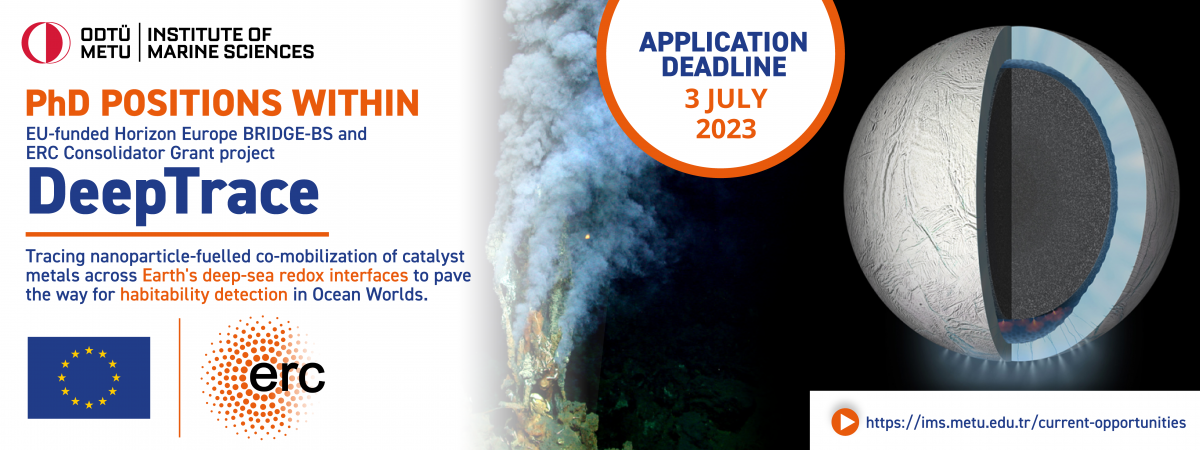
METU IMS invites applications for PhD positions in the frame of ERC Consolidator Grant DeepTrace: A new project that will run from 2023 to 2028 at the Institute of Marine Sciences at METU, Turkey's Centre of Excellence in Oceanography.
Each of these positions offers unique career paths at the intersection of chemical oceanography, nanotechnology and astrobiology and also linked to other EU projects at the institute such as the METU-coordinated Bridge Black-Sea Project.
Candidates from not from marine science background but from all relevant engineering fields, geology, molecular biology, chemistry, physics and mathematics are encouraged to apply to these positions. Motivation and capacity to take on a multidisciplinary challenge is the most important quality.
You will be embedded in a highly diverse and multidisciplinary ERC research group led by Dr Mustafa Yücel and will be interacting with a range of researchers based at METU IMS as well as abroad. The position involves ERC-funded field trips and research cruises, support for travels to major conferences of oceanography, planetary geosciences and astrobiology.
Your salary will be near the level of a public university research assistant in Turkey and may increase in proportion to your skills, qualifications and performance.
For all positions please share a max. 2 page letter of intent, updated CV and names and contact info of 3 references to muyucel@metu.edu.tr and also follow up the procedure defined at
http://ims.metu.edu.tr/graduate-programs
Application deadline for those ready to start in Fall 2023 is 3 July 2023 but feel free to contact as soon as possible as we accept applications through the year for a possible start in Fall 2023.
Full details of the application procedure can be found here. http://ims.metu.edu.tr/graduate-programs
Note that you will need English (TOEFL or equivalent) or ALES/GRE scores.
Project Summary:
ERC CoG DeepTrace will advance a ground-breaking mechanistic, analytical and predictive understanding of how the life-supporting metals cycle across Earth's deep-sea ecosystems such as the Black Sea and hydrothermal vents, developing the application of metal nanoparticles as tracers of planetary redox habitability and bridging the study of Earth's Oceans with the Ocean Worlds of the Solar system. DeepTrace will tap the potential of tracing redox metals as one of best opportunities in the next decade for detecting life in Ocean Worlds, and accelerate improved parametrizations of metal cycles for better prediction of Earth’s marine ecosystems under multi-stressors such as deoxygenation, warming and biodiversity loss.
Below You Can Find The Details Of The 5 Open Positions
Chemical oceanography focusing on the in-situ chemical sensing in the deep sea
Ocean Worlds Geochemistry - Conceptual Integration and Modelling





